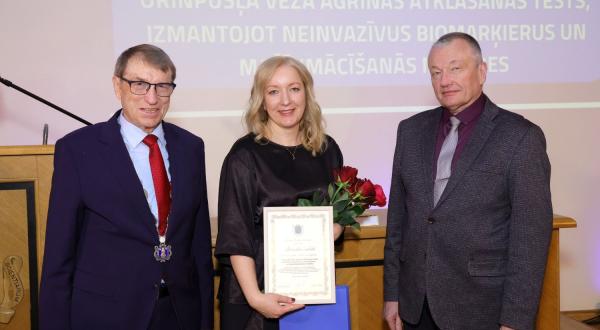On tumour hypoxia studies by RSU scientists and this year’s Noble Prize in medicine
This year the prestigious Noble Prize was awarded to US-born scientists William G. Kaelin and Gregg L. Semenza, and British scientist Peter J. Ratcliffe. The Noble Prize Committee has appreciated their discoveries of how cells sense and adapt to oxygen availability. Cell studies in relation to these discoveries are also taking place in the Laboratory of Molecular Genetics of the Institute of Oncology of the Rīga Stradiņš University (RSU).
Anyone of us knows how much our body needs oxygen. We become more inert and sleepier in low-oxygen conditions. Our cells need oxygen to obtain energy. We can say that we breathe with organelles, the mitochondria in our cells rather than with our lungs. Our lungs are a fan with which oxygen is transferred through the alveolae to the red blood cells, which then deliver it to other cells of the body.
'I am glad that hypoxia studies (about when cells do not get sufficient amount of oxygen) are recognised at a high level. So far, we have known that a cell uses oxygen, however, it can happen that oxygen does not get to them. We have such examples in cardiology like when a person has an infarction. If oxygen does not get to a certain area of the cardiac muscle due to an occluded blood vessel cells gradually get damaged,' explains the leading researcher of the Laboratory of Molecular Genetics of the Institute of Oncology at RSU Inese Čakstiņa speaking on the radio show Known Unknown about the importance of cell research.
'The cell is a fighter, and it tries to resist unfavourable conditions. If the cell feels oxygen deficiency, it slows down active processes so as not to waste so much energy and to reduce oxygen consumption. This Noble Prize has been awarded to the research into how these mechanisms of how a cell restricts oxygen consumption.'
It is interesting that William G. Kaelin and Gregg L. Semenza and Peter J. Ratcliffe did not work as a team. They carried out their research in different institutions of higher education and developed publications about discoveries and evidence found by their laboratories over several years. It is quite common when different researchers in different corners of the world work on one particular topic. This is why scientists publish their research and review papers mentioning the contribution to the industry, because in this way they let others see what they are working so that everyone can advance due to these discoveries.
'As time passes and when we look at all of it from a distance, we can put together pieces of the puzzle and understand the tremendous value of what they have discovered. We probably would not appreciate each one of them separately so much. This is why I believe it is best if some time passes before a Noble Prize is awarded,' muses Čakstiņa.
This discovery on how a cell reacts to oxygen deficiency helps create new medicines for patients with oncological diseases, anaemia and many other diseases. For example, the Laboratory of Molecular Genetics of the Institute of Oncology at RSU is currently studying hypoxia in breast cancer cells.
'We are studying how hypoxia affects tumour cells in the mammary glands and their "response" to the substances used in chemotherapy. There is a theory that hypoxic cells of the tumour survive during therapy, but are in some kind of a "sleepy" condition. This might be why tumours sometimes reoccur, as parts of the active cells die during cancer therapy, but the sleepy cells do not get destroyed and may later "awaken" again,' says Čakstiņa.
The Laboratory of Molecular Genetics of the Institute of Oncology also studies how hypoxia affects different medicines. 'Our goal is to help create medicines that become active in conditions of hypoxia, attacking and destroying tumour cells in a more targeted way. We are not the first to start doing this. Medicines against cancer cells in hypoxia have already been developed and are being tested in clinical trials elsewhere in the world, but their efficiency is still low.'
Cell studies have been taking place in the world since 1838. 'Huge steps have been made in research in the last 50 years, and we know a lot, but there is still so much to learn and discover. The research must go on!' concludes Čakstiņa.
Related news
 RSU research project on early diagnosis of bladder cancer receives recognition from the Latvian Academy of SciencesRecognition, Research, Innovation
RSU research project on early diagnosis of bladder cancer receives recognition from the Latvian Academy of SciencesRecognition, Research, Innovation



